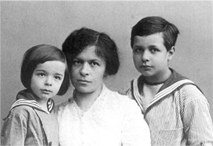The Swiss Years
Texts by Dr. Antonio Moreno González
After his stay in Italy, Einstein and his parents agreed that he should enrol in the prestigious Federal Polytechnic School (Eidgenössische Technische Hochschule) in Zurich to complete studies that would allow him to work in the family business. He failed in his first attempt and instead enrolled in the Cantonal School of Aarau to prepare his matriculation exams for the Polytechnic. During this time he stayed at the home of a schoolteacher, Jost Winteler. It was to prove a fruitful stay, academically (he achieved the education required to be accepted into the ETH) but also emotionally: he fell in love with Marie, the eldest of the Winteler children--his first experience in a long, diverse and stormy love life. Einstein's sister Maja, ended up marrying Paul Winteler and Michele Besso, his close friend from their first meeting in 1896 until the death of the two in 1955, married Anna Winteler.
That same year, 1896, he managed to have his renunciation of German nationality accepted, and so became "stateless" until in 1901 he achieved Swiss nationality and exemption from military service on account of his flat feet and varicose veins. It was to be a transcendental year in his life: he was finally admitted to the Polytechnic, which he remembered as "a beautiful corner of the world". Among his companions was Marcel Grossmann - a lifelong friend - and Mileva Maric, who was soon to become his first wife. He struck up a close friendship with Conrad Habicht and Maurice Solovine, with whom he formed what they called the "Olympia Academy". They met nearly every day to talk smoke and read their favourite writers: Spinoza, Hume, Mach, Poincaré, Sophocles, Racine and Cervantes. Einstein had fond memories of those meetings; He headed a letter to Solovine, written just a few years before his death (3/4/1953): "to the immortal Olympia Academy"
Einstein's plans did not coincide with those of his family; he aspired to qualify as a teacher in physics and maths. After graduating with good marks in 1900, he sought a position as a junior lecturer in the Polytechnic, but was not accepted. That same year he begins publishing in Annalen der Physik , the journal of his subsequent successes, with an article entitled "Conclusions Drawn from the Phenomena of Capillarity".
He was unsuccessful in his attempt to find a position at other universities, but he did manage to get work as a substitute teacher in various secondary schools in Swiss towns, before joining the patent office in Berne on 23 June 1902. He stayed there for seven fruitful years, during which he laid the foundations for a new form of physics. His father died in 1902 and the next year he married Mileva; they had already had a daughter, Lieserl, of whom little is known (indeed, there are doubts as to whether she survived an illness she suffered in her first years of life). Their first son, Hans Albert (1904 - 1973), was born in Berne and the second Eduard (or "Tete") in Zurich (1910 - 1965), where Einstein was working as an associate lecturer of theoretical physics in the university.

Mileva Maric (1875-1948), Albert Einstein's first wife with their children Eduard (1910-1965) and Hans Albert (1904-1973), 1914
